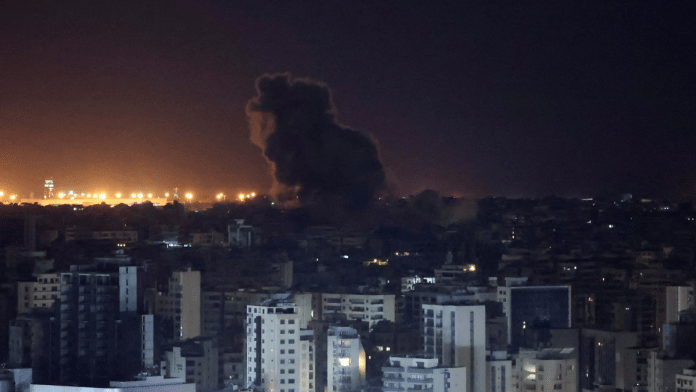Israel is back to doing what it does best – using military force to dominate West Asia. Through this military domination, it seeks “normalisation” and integration with West Asia. It continues to look with suspicion at political solutions for securing that elusive security and peace it desperately seeks.
Israel is in a vicious neighbourhood surrounded by proxies of Iran, which include Hezbollah, Hamas and the Houthis who take every opportunity to attack, debilitate and weaken Israel. However, Israel is in no mood to give up what is clearly an anachronism in the era of international law and decolonisation – the illegal occupation of Palestinian territories.
In fact, earlier this week, the Chagos archipelago returned to Mauritian sovereignty from the United Kingdom. The advisory ruling of the International Court of Justice in July has only given additional legal basis – if at all it was required – to a Palestinian state by declaring Israel’s occupation of the Gaza Strip and the West Bank, including East Jerusalem, as unlawful. Israel, though, has already taken the fight in Gaza to the West Bank and rapidly expanding Israeli settlements, and is evicting Palestinians from their homes and farms.
However, with the latest round of attacks and counterattacks, the gloves are off. For the first time, Iran has attacked Israel directly from its own soil not once but twice this year. The assassination of Hamas leader Ismail Haniyeh, exploding pagers taking with them a chunk of Hezbollah operatives and the targeted killing of Hezbollah leader Hassan Nasrallah have made it impossible for the much-sanctioned and debilitated Iran not to react, lest its strategic restraint is taken for weakness and its non-state allies slip out of its grasp for failing to protect them. This has irretrievably changed the rules of engagement between the two countries, which for decades fought through their proxies or took refuge behind the veil of denial for killings. As Iran says, the phase of unilateral self-restraint has ended.
West can only express displeasure
PM Benjamin Netanyahu has pulverised Gaza and certainly degraded Hamas, but still resists any call for a ceasefire. Israel has now entered South Lebanon and hopes to degrade Hezbollah through targeted killings. History tells us that the last time Israel invaded Lebanon in 2006, it withdrew after 34 days after losing 119 soldiers and 43 civilians, with United Nations Security Council-approved ceasefire terms. However, this will not weigh too heavily on PM Netanyahu’s mind since he is convinced that this is the most opportune moment to inflict an irrecoverable blow to non-state proxies of Iran and break the shackles.
For one thing, the United States is being led by Israel rather than the other way around. This will be so at least till their presidential elections are over. Even after that, one cannot envisage any meaningful pressure from the US on Israel since what Israel is doing suits them fine. Moreover, even if the US hates being dragged into a direct conflict with Iran, this is what Israel may try to do. The West is helpless except to express displeasure at the mounting Palestinian civilian killings in Gaza. Israel has sold them the notion that it is the democratic bastion of Western civilisation in a bad neighbourhood.
But what is deafening is the silence of Arab countries, especially Gulf monarchies. The Gulf, with its traditional rivalry with and now fear of Iran and its proxies, and its historical Shia-Sunni divide, is content to see reduced Iranian presence in the region. It has bought into the Israeli-American narrative that Iran is the main problem and not the Palestinian issue. Some even helped the US intercept Iranian missiles fired at Israel. That is why normalisation in the region will happen, unfortunately with or without a resolution of the Palestinian issue.
Also read:
Unraveling world order
As far as the rest of the world is concerned, Russia or China or even big Asian powers either do not have the clout to influence events or are unwilling to use it beyond a point. Despite its huge stake in West Asia, India has stayed on the sidelines primarily due to its growing strategic interest in Israel and integration with the region. New Delhi abstained from the UN General Assembly resolution in September 2024, which demanded that Israel end its unlawful presence in occupied Palestinian territory – a resolution that India would have usually voted for. Hundreds of Indian workers have been sent to Israel to replace Palestinian workers.
And so, the world sits on the sidelines and adopts realpolitik as foreign policy when international law is broken with impunity and the world order is unravelling.
With Israel deciding to widen the conflict, negotiations for the safe return of its hostages in Gaza is probably not uppermost in its mind. This is the same Israel that in 2011 had traded 1,027 prisoners (almost all Palestinian and Arab-Israeli) for the release of one Israeli soldier, Gilad Shalit.
But is Israel any more secure now than before? Far from it. The country’s regional military forays on multiple fronts may degrade Iranian proxies but cannot get it the security it seeks without a political goal – a goal it is reluctant to pursue. Israel now stands exposed despite all the missile cover and weaponry the US provides. It has brought Iran into direct confrontation. One year and over 41,000 Palestinian lives later, Gaza is still unfinished business. Houthis continue to threaten Red Sea shipping. The ground offensive in Lebanon may get bogged down without a ceasefire. And a ceasefire can only be a beginning, not the end goal.
TS Tirumurti is former ambassador/Permanent Representative of India to the United Nations, New York. His X handle is @ambtstirumurti. Views are personal.
(Edited by Zoya Bhatti)






